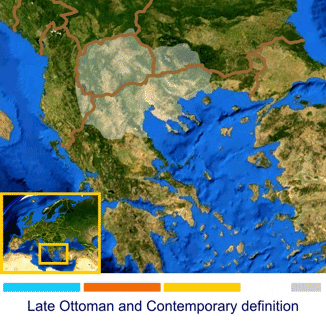
The name Macedonia is used in a number of competing or overlapping meanings to describe geographical, political and historical areas, languages and peoples in a part of south-eastern Europe. It has been a major source of political controversy since the early 20th century. The situation is complicated because different ethnic groups use different terminology for the same entity, or the same terminology for different entities, with different political connotations.
Historically, the region has presented markedly shifting borders across the Balkan peninsula. Geographically, no single definition of its borders or the names of its subdivisions is accepted by all scholars and ethnic groups. Demographically, it is mainly inhabited by four ethnic groups, three of which self-identify as Macedonians: two, a Bulgarian and a Greek one at a regional level, while a third ethnic Macedonian one at a national level. Linguistically, the names and affiliations of languages and dialects spoken in the region are a source of controversy. Politically, the rights to the extent of the use of the name Macedonia and its derivatives has led to a diplomatic dispute between Greece and North Macedonia. After using the provisional reference of the "former Yugoslav Republic of Macedonia" (FYROM), Greece and the then-Republic of Macedonia reached an agreement that the latter would change its name to North Macedonia. It came into effect on 12 February 2019.